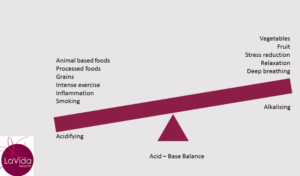Have you got issues with your menstrual cycle? Perhaps you think your symptoms are just a “normal part of being a woman”. I regularly see women in the clinic with problems with their menstrual cycle and many of them have accepted that’s just the way it is. However, whilst menstrual cycle problems are common, they are not normal and you shouldn’t have to put up with them. There are things you can do to improve your situation.
Your menstrual cycle is controlled by four key reproductive hormones including; follicle stimulating hormone, luteinising hormone, oestrogen and progesterone. An imbalance in these hormones can lead to menstrual issues or show up in the body in other ways.
So what are some of the signs of a hormone imbalance and what causes your hormones to be disrupted in the first place? Finally, what can you do about it?
Hormone imbalances can present in many ways including:
- Irregular menstrual periods
- Painful periods
- Heavy periods
- Short or very long period bleeds
- Period clotting
- Low libido
- Acne
- Unwanted hair growth
- Low mood or irritability (or both)
- Poor sleep
- Pre-menstrual symptoms (i.e. breast tenderness, digestive upsets, fatigue, food cravings etc)
- Headaches or migraines
- Infertility
- Hot flushes and night sweats
The causes of hormone imbalances can be many and varied such as:
- A high intake of sugar, refined foods and processed foods
- High levels of stress
- Alcohol and smoking
- Medications
- Hormonal contraceptives
- Lack of exercise or sluggish digestion resulting in reduced ability to remove waste
- Environmental toxins such as pollutants, pesticides, farming residues and radiation.
Luckily what you eat has a profound effect on your hormones (and your overall well-being). By eating a well-balanced diet you can support your body’s production, metabolism and excretion of hormones to keep them balanced and functioning well, leading to a healthy menstrual cycle.
Changing your diet is also the most cost effective way to optimise your hormone health before your symptoms turn into something persistent that needs further intervention and treatment.
My top 5 dietary tips for improving your hormone health and therefore your menstrual cycle
Eat your broccoli (and other cruciferous vegetables)
Broccoli and other cruciferous vegetables such as brussels sprouts, cabbage, cauliflower, collard greens, kale, mustard greens, radish, bok choy, chinese cabbage, arugula and watercress are great for our hormone health.
These vegetables contain glucosinolates, sulfur-containing compounds that create the bitter or spicy taste, and promote the elimination of oestrogen. Excess oestrogen can have detrimental effects on our hormone balance if not effectively removed from the body.
If you have an under-active thyroid function, make sure you cook your cruciferous veg to deactivate goitrin (a naturally occurring compound) which may interfere with thyroid hormone synthesis.
Aim for 30g of fibre every day
To ensure the elimination of metabolised hormones such as oestrogen, you need a healthy bowel to effectively remove waste from your body. Fibre keeps your digestive tract clean. It’s like a big broom for your gut and is essential for the health of all your bodily systems, not just keeping your hormones healthy.
Fibre rich foods include fruits and vegetables (leave the skin on), beans, legumes, whole grains and nuts.
If you need a refresher on fibre read my blog: “Fibre! How to ensure you get enough in your daily diet”
Don’t forget the fat
You need to eat fat to produce hormones. Eating a well-balanced diet that includes a variety of different fats, including omega-3 acids, ensures you are giving your body the opportunity to make the right amount of hormones.
Omega-3 fatty acids are particularly good for your hormone health because they have anti-inflammatory properties. With many menstrual cycle issues, inflammation is an underlying contributing factor, so these fats can be very useful from a therapeutic perspective.
You can find omega-3 fatty acids in oily fish such as salmon, sardines, trout, herring, anchovies, walnuts, chia seeds, and linseeds/flaxseeds (and their oil). Our western diet does not contain enough omega-3 fatty acids so we all need to increase our intake of these foods.
Other sources of healthy fats (monounsaturated fats) include; avocado, nuts, seeds, and olive oil.
There are fats, however, you should be avoiding and these are trans-fatty acids and partially hydrogenated oils. You find these fats in deep fried foods, commercially baked goods and margarine. These fats change the structure of the natural fatty acid to unnatural forms, which may interfere with the body’s ability to utilise the important essential fatty acids, such as omega-3 fatty acids.
Choose a variety of colourful fruits and vegetables
Your eggs are particularly vulnerable to oxidative stress and as we age oxidative stress naturally increases. Therefore, you need to match this oxidative stress with powerful antioxidants such as vitamins A, E, C and zinc. (If you’re keen to fall pregnant, then this is especially important for you).
In addition, antioxidant rich foods support progesterone production, which is that feel good hormone vital for reducing those feelings of irritability, mood swings or low mood that might arise before you get your period.
Dark green leafy vegetables, blueberries, carrots, pumpkin, capsicum, zucchini, eggplant, avocado, oranges etc, all add some spectacular colour to your plate. A lovely side effect of dishing up a good looking colourful meal is the high level of antioxidants you are eating.
Avoid refined and processed foods
Refined and processed foods provide very little nutritional benefits and can often do more harm than good. These foods can be high in sugar, salt, hydrogenated fats, preservatives, artificial colours or flavours, or stripped of nutrients usually found if eaten in a less processed form (such as wholemeal bread versus white bread). All of these can lead to inflammation in the body thereby disrupting your hormone balance and menstrual cycle.
If you are regularly eating processed foods, have a look at the packaging and read the ingredients list. If you can’t pronounce all the ingredients or there are numbers listed then I recommend putting it back and swapping it over for something else. Preferably choose something from the fresh food section of your supermarket but if that’s not an option, try to find something that has no artificial colours, flavours and preservatives.
Do you need help to improve your diet?
I can tailor a diet plan to optimise your hormone production, metabolism and elimination, and provide the support you need to stay on track. Sometimes, having someone else to keep you to account is what you need to change dietary habits.
Any dietary changes will be made specific to your particular menstrual issues, any dietary requirements you may have (such as vegetarian or vegan), and in consultation with you so changes are achievable and sustainable for the long term.
Are you already eating well and still having issues with your menstrual cycle?
Occasionally hormone imbalances need to be treated using herbal medicines and/or nutritional supplements. I’ve had great success normalising menstrual cycles with herbs and nutrients which often have the added benefit of improving other body symptoms and your overall health. If you want to learn more about menstrual cycle problems you might like this blog: Is your menstrual cycle ruining your life?





